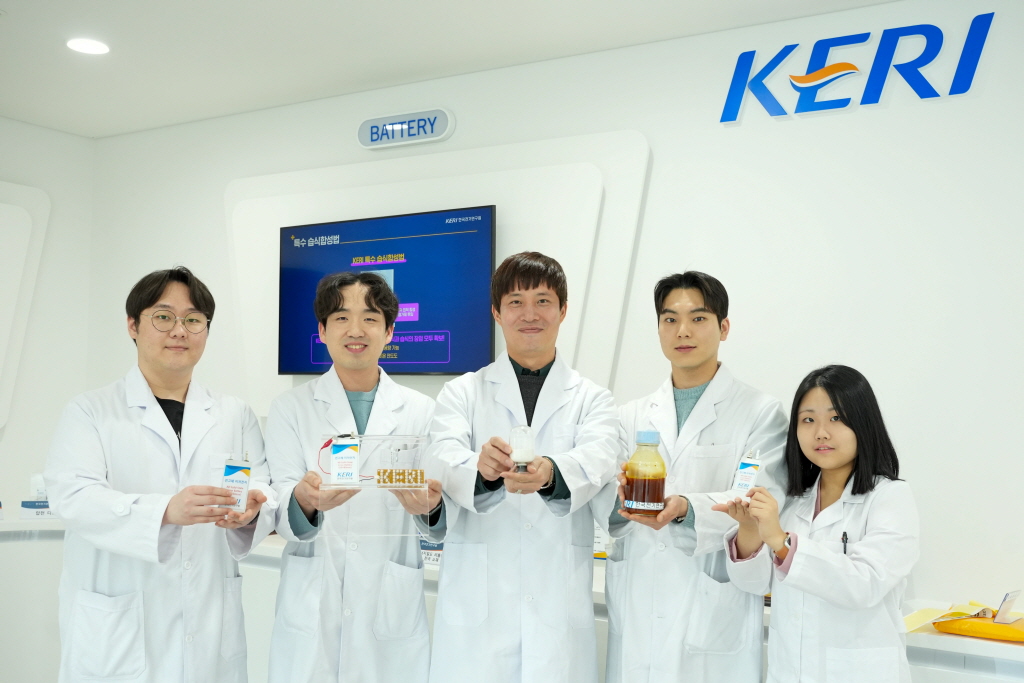폭발·화재 위험 없는 전고체전지 상용화에 한 걸음 다가선 한국전기연구원(KERI)의 획기적인 연구결과가 국제 저명 학술지의 논문으로 게재됐다. KERI 차세대전지연구센터 소속의 박준우 박사와 성정환 연구원(UST KERI 캠퍼스 학생 연구원)이 공정 과정과 비용은 절반 이하로 줄이고, 결과물의 품질은 2배 이상 높인 ‘고체전해질(황화물계) 입도 제어 및 습식 합성 공정’ 기술을 개발했다.

▲KERI 박준우 박사(가운데)팀이 습식 합성 공정으로 제조된 고체전해질과 이를 활용한 전고체전지 시제품을 들고 포즈를 취하고 있다.
박준우 박사팀, ‘고체전해질 습식 합성 공정’ 개발
폭발·화재 위험 없는 전고체전지 상용화에 한 걸음 다가선 한국전기연구원(KERI)의 획기적인 연구결과가 국제 저명 학술지의 논문으로 게재됐다.
KERI 차세대전지연구센터 소속의 박준우 박사와 성정환 연구원(UST KERI 캠퍼스 학생 연구원)이 공정 과정과 비용은 절반 이하로 줄이고, 결과물의 품질은 2배 이상 높인 ‘고체전해질(황화물계) 입도 제어 및 습식 합성 공정’ 기술을 개발했다.
전고체전지는 양(+)극과 음(-)극 사이에서 이온을 전달하는 ‘전해질’을 액체가 아닌, 화재나 폭발 위험성이 낮은 고체로 대체한 것이다.
반면에 고체전해질은 전고체전지(특히 양극(+))에 활용되려면 입자 크기가 머리카락 굵기의 100분의 1에 해당하는 수 마이크로미터 수준으로 매우 작아야 한다.
KERI의 성과는 단순한 공정만으로 미세하고 이온 전도도까지 높은 고체전해질을 대량으로 생산하는 기술을 개발한 것이다.
그동안 국내외 많은 연구진이 다양한 방법으로 제조했던 고체전해질은 입자가 커서 기계적인 분쇄 등 별도의 공정이 필요했다. 이 과정에서 시간적·물리적 비용 소모가 드는 것은 물론, 분쇄로 인한 고체전해질의 성능 저하는 상용화를 막는 큰 걸림돌이었다.
이에 박준우 박사팀은 미세한 원재료(황화리튬 등)를 도입하고, 각각의 물질이 화학 반응으로 발생시키는 ‘핵 생성(Nucleation)’ 속도를 제어하여 최종 생성물의 입도를 크게 줄이는 방법을 활용했다. 복잡한 과정 없이 간단한 습식 합성 공정만으로 미세한 고체전해질을 제조할 수 있게 된 것이다.
이러한 성공적인 화학적 조성 제어로 결과물의 이온 전도도는 기존 고체전해질 공정(고에너지 볼밀링을 통한 ‘건식 합성’ 및 분쇄)보다 약 2배 이상(2mS/cm -> 4.98mS/cm) 높았다. 수년간 많은 재료의 실험과 다양한 분석으로 최적의 조합을 찾은 KERI 연구팀의 큰 성과다.
관련 연구결과는 우수성을 인정받아 에너지 분야 국제 저명 학술지인 ‘에너지 스토리지 머티리얼스(Energy Storage Materials)’의 3월호 논문으로 게재됐다. 학술지의 영향력을 평가하는 ‘JCR Impact Factor’는 20.4로, 해당 분야 상위 5.2%에 속한다.
KERI 박준우 박사는 “원재료의 적절한 선택과 화학 반응의 확실한 제어로 탄생한 연구원만의 ‘단순 공정’으로 고체전해질을 미세화하기 위해 진행됐던 복잡하고 비싼 공정을 건너뛸 수 있게 됐다”라며 “매우 간단해진 공정에도 고체전해질의 품질은 훨씬 뛰어나 양산화·상용화를 위한 ‘기업 접근성’과 ‘효율성’을 모두 확보했다”라고 전했다.
성과의 특허 출원 등을 다수 완료한 KERI는 관련 기술이 전고체전지 업계의 많은 관심을 받을 것으로 보고, 수요 기업을 발굴하여 기술이전을 추진할 계획이다.
또한 기존 개발·보유했던 ‘특수 습식합성법(특허받은 특수 첨가제를 통해 1/10 수준의 저렴한 원료(출발물질)로도 고체전해질을 대량 생산하는 기술)’과 이번 성과를 연계해 고품질의 고체전해질을 저렴하고 대량으로 제조하는 전문 기술 시장을 선도한다는 목표다.
한편 KERI는 과학기술정보통신부 국가과학기술연구회 산하 정부출연연구기관이다. 이번 연구는 KERI 기본사업과 산업부의 ‘나노융합혁신제품기술개발 지원 사업’으로 수행됐다.
